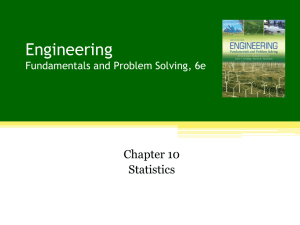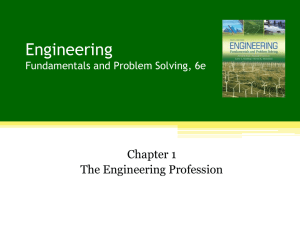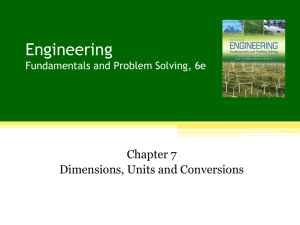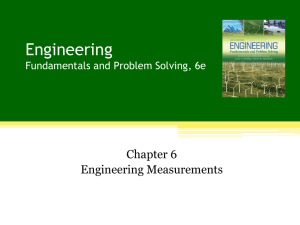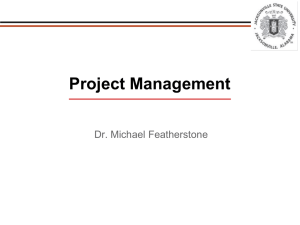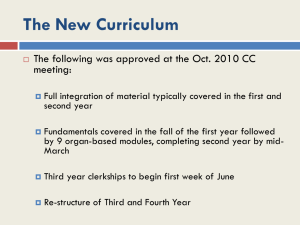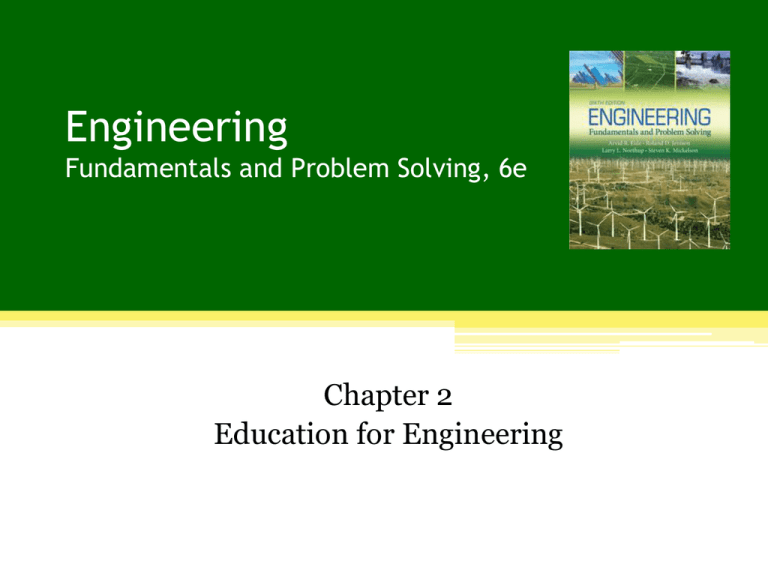
Engineering
Fundamentals and Problem Solving, 6e
Chapter 2
Education for Engineering
Chapter Objectives
• Understand the skills and abilities needed to pursue
an engineering degree
• Understand how to prepare for a meaningful
engineering career workplace
• Understand the importance of obtaining an
internship/cooperative education experience
• Realize the importance of the engineering
profession and the steps to becoming a professional
engineer
Engineering: Fundamentals and Problem Solving, 6e
Eide Jenison Northup Mickelson
Copyright © 2012 by The McGraw-Hill Companies, Inc. All rights reserved.
2
Education for Engineering
Questions to consider:
• What are the desirable
characteristics for success in an
engineering program?
• What knowledge and skills should
be acquired in college?
• What is meant by continuing
education with respect to an
engineering career?
Engineering: Fundamentals and Problem Solving, 6e
Eide Jenison Northup Mickelson
Copyright © 2012 by The McGraw-Hill Companies, Inc. All rights reserved.
3
Desirable Characteristics for
Engineering Students
1. Interest and ability in math and science.
2. Ability to think in a logical manner.
3. Knack for problem solving
4. Curiosity about how and
why things work.
5. A passion for solving
modern-day challenges
Engineering: Fundamentals and Problem Solving, 6e
Eide Jenison Northup Mickelson
Copyright © 2012 by The McGraw-Hill Companies, Inc. All rights reserved.
4
Desirable Characteristics for
Engineering Students
6. Leadership in student organizations
7. Internship or cooperative education experiences
8. Participation in community or service learning projects
9. Participation in many other related activities.
Engineering: Fundamentals and Problem Solving, 6e
Eide Jenison Northup Mickelson
Copyright © 2012 by The McGraw-Hill Companies, Inc. All rights reserved.
5
Typical Course of Study
Engineering
education is not
limited to
technical courses
Engineering: Fundamentals and Problem Solving, 6e
Eide Jenison Northup Mickelson
Copyright © 2012 by The McGraw-Hill Companies, Inc. All rights reserved.
6
Preparation for an Engineering
Work Environment
ABET Accreditation: a-k
Engineering programs must demonstrate that their
students attain the following outcomes:
(a) Knowledge of math, science, and engineering
(b) Experimental design
(c) Design with constraints
Engineering: Fundamentals and Problem Solving, 6e
Eide Jenison Northup Mickelson
Copyright © 2012 by The McGraw-Hill Companies, Inc. All rights reserved.
7
Preparation for an Engineering
Work Environment
ABET Accreditation: a-k
(d) Multidisciplinary teamwork
(e) Problem solving
(f) Professionalism
(g) Communication
(h) Broad Impact
Engineering: Fundamentals and Problem Solving, 6e
Eide Jenison Northup Mickelson
Copyright © 2012 by The McGraw-Hill Companies, Inc. All rights reserved.
8
Preparation for an Engineering
Work Environment
ABET Accreditation: a-k
(i) Life-long learning
(j) Contemporary issues
(k) Modern engineering tools
Engineering: Fundamentals and Problem Solving, 6e
Eide Jenison Northup Mickelson
Copyright © 2012 by The McGraw-Hill Companies, Inc. All rights reserved.
9
Cooperative Education/Internships
• Co-op: Alternating full-time
college training with full-time
work experience.
• Internship: A single work
period of institutionally
supervised full-time
employment.
Engineering: Fundamentals and Problem Solving, 6e
Eide Jenison Northup Mickelson
Copyright © 2012 by The McGraw-Hill Companies, Inc. All rights reserved.
10
Continuing Education
Maintaining an up-to-date understanding of
your area of expertise through:
• Seminars
• Short courses
• Professional conferences
Engineering: Fundamentals and Problem Solving, 6e
Eide Jenison Northup Mickelson
Copyright © 2012 by The McGraw-Hill Companies, Inc. All rights reserved.
11
The Engineer as a Professional
• Professionalism
• Professional Registration
• Professional Ethics
• Professional Societies
Engineering: Fundamentals and Problem Solving, 6e
Eide Jenison Northup Mickelson
Copyright © 2012 by The McGraw-Hill Companies, Inc. All rights reserved.
12
Ethics
Engineers must adhere to the highest principles of ethical conduct.
Engineers must exhibit:
Engineers must protect:
• Honesty
• Fairness
• Public health
• Integrity
• Equity
• Safety and
• Impartiality
• Welfare
Engineering: Fundamentals and Problem Solving, 6e
Eide Jenison Northup Mickelson
Copyright © 2012 by The McGraw-Hill Companies, Inc. All rights reserved.
13
Engineers’ Creed
Adopted by National Society of Professional Engineers, June 1954
As a Professional Engineer, I dedicate my professional knowledge
and skill to the advancement and betterment of human welfare.
I pledge:
• To give the utmost of performance;
• To participate in none but honest enterprise;
• To live and work according to the laws of man and the highest
standards of professional conduct;
• To place service before profit, the honor and standing of the
profession before personal advantage, and the public welfare above
all other considerations.
In humility and with need for Divine Guidance, I make this pledge.
Engineering: Fundamentals and Problem Solving, 6e
Eide Jenison Northup Mickelson
Copyright © 2012 by The McGraw-Hill Companies, Inc. All rights reserved.
14
Conclusions
• Pursuing an engineering degree will be both challenging
and rewarding.
• It is important to develop the
− Overall knowledge
− Skills
− Abilities
needed for a successful engineering career through
− a well-designed academic program (including
experiential education)
− co-curricular experiences
− extra-curricular experiences.
Engineering: Fundamentals and Problem Solving, 6e
Eide Jenison Northup Mickelson
Copyright © 2012 by The McGraw-Hill Companies, Inc. All rights reserved.
15

